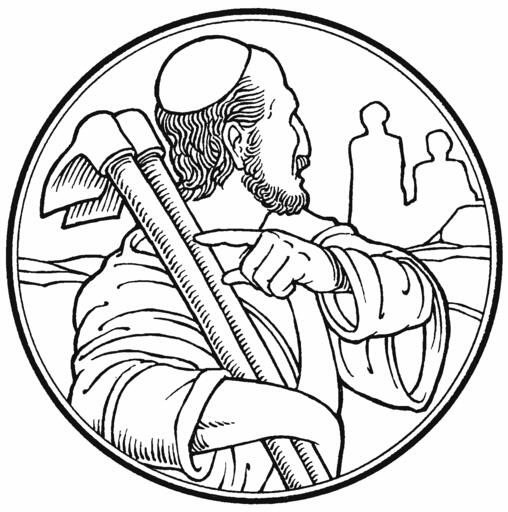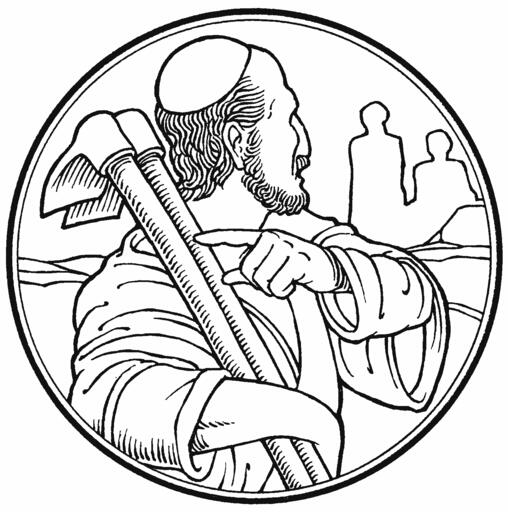Septuagesima
Sermon • Submitted • Presented • 12:19
0 ratings
· 9 viewsFiles
Notes
Transcript
The Master of the vineyard is God the Father. The vineyard is the Church. And you are the idle and unemployed whom God finds and sends into His vineyard. Notice that when God calls each new group into the vineyard He says to them, “You also go into the vineyard.” He doesn’t say “that vineyard over there” or even “My vineyard.” He says, “the vineyard.” That’s because there is only one vineyard—one holy, catholic, and apostolic Church.
You are here within the vineyard, within that one church of God, and that’s a very good thing, because this is the only place of salvation. Unlike any earthly place of employment, where you may come or go at will and seek employment elsewhere, God’s vineyard is the only game in town. When night falls and the long day of grace comes to an end at last, only those within the Church will be saved, just as only Noah’s family was safe within the ark.
You are here within the vineyard, and how did you get here? There is only one answer. God put you here. Did you notice the group of workers that came knocking at the master’s door, asking please to be let into the vineyard? No, you didn’t. That’s because that group doesn’t exist. The only people in the vineyard are the ones whom God found. Motivated by His great mercy, God goes out at the beginning of the day. He goes out again at the third hour, at the sixth hour, at the ninth hour, and at the last hour. Motivated by His desire that none would be lost, but that all would turn from their sin and be saved, God goes out again and again throughout the day to gather more and more workers into His vineyard.
And what kind of workers does God find? What caliber of talent does He discover in the labor pool? Well, He found you, didn’t He? In other words, God finds poor, miserable sinners. He forgives them and gives them a place in His vineyard. He finds lazy, unemployed, idlers and sets them to work. And when He asks them, “Why have you been standing here idle all day?” and they answer, “Because no one would hire us,” they aren’t exactly lying. There’s a reason no one would hire us, and it wasn’t because we were overqualified. Let’s be honest. God did not pursue anyone here because of the unique skills you brought to the table. He pursued you in spite of these things. Admit the truth. When God found you, the only talent you had was the talent for sinning, and even in that regard you were mediocre and unremarkable. As the Scriptures say: We once walked with “the sons of disobedience, among whom also we all once conducted ourselves in the lusts of our flesh, fulfilling the desires of the flesh and of the mind, and were by nature children of wrath, just as the others. But God, who is rich in mercy, because of His great love with which He loved us, even when we were dead in trespasses, made us alive together with Christ. For by grace you have been saved. We were aliens from the commonwealth of Israel and strangers from the covenant of promise, having no hope and without God in the world. But now in Christ Jesus you who once were far off have been brought near by the blood of Christ.” (Eph 2:2–5, 12–13).
We know what sort of workers God brings into His vineyard. And we know what they were up to before being rescued. But the chief thrust of the parable is what happens after they are set to work in the vineyard. When evening had come, the owner of the vineyard said to his steward, “Call the laborers and give them their wages, beginning with the last to the first” (Mt 20:8). The wages of sin is death, but the gift of God is eternal life in Christ Jesus our Lord (Rom 6:23). God desires to give this gift of eternal life to all, and this is where the problems in the church begin, because God desires to give to the last the same as He gives to the first. When those came who were hired about the eleventh hour, they each received a denarius. But when the first came, they supposed that they would receive more; and they likewise received each a denarius. And when they had received it, they complained against the landowner, saying, “These last men have worked only one hour, and you made them equal to us who have borne the burden and the heat of the day” (Mt 20:9–12).
The general principle of this parable is that the amount of trouble people cause within the church seems to correspond directly to the length of time they’ve been here. None of the new converts are complaining. They’re too happy to have been rescued from this sinful world. They’re overjoyed to be receiving the same wages as everyone else, wages they know they do not deserve. But the longer we’ve been in the vineyard, the more we might come to think we do deserve the gifts of God. Those who came at the first hour begin to resent the third hour crowd. And the third hour resents the sixth hour. And the ninth hour folks know that at least they’re not as bad as the eleventh hour crowd. Before you know it, the members of the church have arranged themselves into a pecking order more complex than the Hindu caste system.
And so, when the steward hands out the same wages to all, as God commands him to do, those who earlier in the day would have been happy recipients are now filled with resentment at the Master of the vineyard. At least, though, these ones in the parable are angry at the Master. They take their complaint to God, not the steward. As a steward of the Mysteries, and one who has been tasked with handing out the gifts of God without respect to persons, I’ve found that people are more likely to complain to the steward. So let’s give the disgruntled workers in the parable some credit. They, at least, know that their problem is with God. “These last have worked only one hour, and you have made them equal to us who have borne the burden and the heat of the day.”
The angry workers are quick to list what they have done for God, and equally quick to point out what others have failed to do. They know who got here at what time. “These last have worked only one hour, but we have borne the burden of the day. And also the heat of the day—don’t forget that. And we were happy to serve in the fields of the Lord, until we noticed that the less deserving are getting paid the same!”
They accuse God of unrighteousness, having forgotten that they too are undeserving of the least of His mercies. The Master doesn’t ask about this, but it would be curious to find out how many grapes they put into their baskets versus how many went into their mouths. It’s not as though we have done God a favor by being in His vineyard longer. No, it means only that we have been greater recipients of His mercy, living more of our lives within the blessings and protection of the church. If you were baptized as an infant, rejoice that God in His mercy spared you a life apart from the forgiveness of Christ. And if you were brought into the church at the eleventh hour, rejoice that God desires to give to the last as He does to the first. Don’t be angry that God would welcome a murderer who repents on his deathbed. Don’t resent those whom you consider less worthy than you. Instead, rejoice that God has received you. He gives His gifts equally to all, even though all are equally undeserving.
Within the vineyard of Christ, one can find a vast array of sinners, at least according to outward appearances. And it must be said that all sins are not equal—some sins are more far more destructive in this life than others. But God, in His great mercy, desires to treat with all sinners great and small in the same way, with the same forgiveness. To this end He commands His steward to call the laborers and to give to them equally from His abundance. A few moments from now, we will all kneel together at our Lord’s table. And whether you came first or last, the steward of Christ will hand over what He has received from the hand of the Lord. He will speak and act as he is commanded, delivering the same Baptism, the same Body and Blood, the same forgiveness, the same eternal life. “Take what is yours,” Jesus says, “and go your way in peace. For it is the Master of the vineyard’s good pleasure to give to the last the same as He has given to you.” Amen.
ADVERTISEMENT
Related Media
See moreRelated Sermons
See more

Dean Herberts • 10 views


Dean Herberts • 4 views


St. Paul Lutheran Church • 48 views • 11:51



